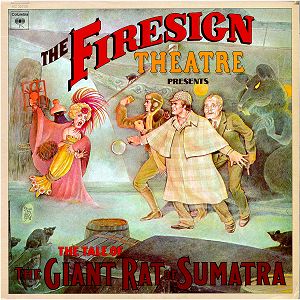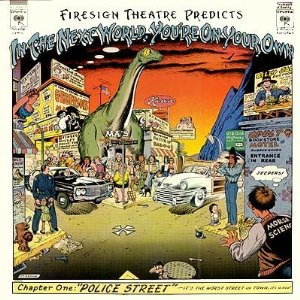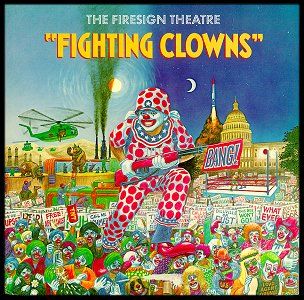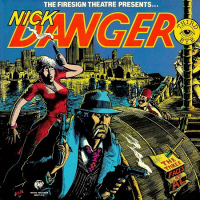
Philip Baine Austin was an American comedian and writer, best known as a member of the Firesign Theatre.

The Firesign Theatre was an American surreal comedy troupe who first appeared on November 17, 1966, in a live performance on the Los Angeles radio program Radio Free Oz on station KPFK FM. They continued appearing on Radio Free Oz, which later moved to KRLA 1110 AM and then KMET FM, through February 1969. They produced fifteen record albums and a 45 rpm single under contract to Columbia Records from 1967 through 1976, and had three nationally syndicated radio programs: The Firesign Theatre Radio Hour Hour [sic] in 1970 on KPPC-FM; and Dear Friends (1970–1971) and Let's Eat! (1971–1972) on KPFK. They also appeared in front of live audiences, and continued to write, perform, and record on other labels, occasionally taking sabbaticals during which they wrote or performed solo or in smaller groups.

Don't Crush That Dwarf, Hand Me the Pliers is the Firesign Theatre's third comedy album, released by Columbia Records in July 1970. In 1983, The New Rolling Stone Record Guide called it "the greatest comedy album ever made". It was nominated for a Hugo Award for Best Dramatic Presentation in 1971 by the World Science Fiction Society. In 2005, the US Library of Congress added the album to the National Recording Registry and called the Firesign Theatre "the Beatles of comedy."

Waiting for the Electrician or Someone Like Him is the first comedy album recorded by the Firesign Theatre. It was originally released in January 1968 by Columbia Records.

Give Me Immortality or Give Me Death is a comedy album by the Firesign Theatre that was released in 1998 on Rhino Records. Its main theme satirizes 1990s radio formats and public hysteria over the Y2K programming bug. Give Me Immortality... is the first of the Firesign Theatre's Millennium CD trilogy We're Doomed, which includes Boom Dot Bust and Bride of Firesign.

David Ossman is an American writer and comedian, best known as a member of the Firesign Theatre and screenwriter of such films as Zachariah.

How Can You Be in Two Places at Once When You're Not Anywhere at All is the second comedy album recorded by the Firesign Theatre. It was originally released in July 1969 by Columbia Records.

Everything You Know Is Wrong is the eighth comedy album by the Firesign Theatre. Released in October 1974 on Columbia Records, it satirizes UFO conspiracy theories and New Age paranormal beliefs such as Erich von Däniken's Chariots of the Gods and claimed psychic Uri Geller, which achieved wide public attention by that time.

The Tale of the Giant Rat of Sumatra is the seventh comedy album produced by the Firesign Theatre and released in January 1974 by Columbia Records. It is a send-up of a Sherlock Holmes adventure, "The Giant Rat of Sumatra", which was not written by Sir Arthur Conan Doyle but was referenced in his Holmes tale, "The Adventure of the Sussex Vampire", written in 1924.

The Firesign Theatre's Box of Danger: The Complete Nick Danger Casebook is a four-CD boxed set of most recorded material by comedy group the Firesign Theatre containing their fictional character Nick Danger, portrayed by Phil Austin. Danger is a parody of the hard-boiled detective genre, and is often announced as "Nick Danger, Third Eye", a parody of the term private eye. Danger stories involve stereotypical film noir situations, including mistaken identity, betrayal, and femme fatales. Danger originally appeared on the 1969 album How Can You Be in Two Places at Once When You're Not Anywhere at All, and was reprised in various live shows, radio appearances and albums, including the 1979 Nick Danger: The Case of the Missing Shoe, 1984 The Three Faces of Al, and 2001 The Bride of Firesign.

In the Next World, You're on Your Own is the ninth and last comedy album recorded by the Firesign Theatre for Columbia Records. It was released in October 1975.

Roller Maidens From Outer Space is a 1974 comedy album by Phil Austin, one of the members of the comedy group Firesign Theatre. Although the record is considered to be Austin's "solo" album, the other three Firesigns make vocal contributions throughout, and are thanked by Austin in the liner notes. A complex lampoon on television and society, Austin's record is much in the same vein as the Firesign Theatre's Don't Crush That Dwarf, Hand Me the Pliers and fellow Firesign members Phil Proctor and Peter Bergman's TV or Not TV. The television theme is carried over into the record sleeve, which features liner information displayed as if it were a TV Guide listing, complete with stylized channel numbers and little blurbs of content.

Not Insane or Anything You Want To is the sixth album released by the Firesign Theatre on Columbia Records. It was released in October 1972 and includes some material that was recorded in the studio as well as some material that was recorded before a live audience. The full title is listed on the spine of the record album as Not Insane or Anything You Want To. The abbreviated title Not Insane appears on the front of the album cover, while Or Anything You Want To appears on the back cover. It is usually referred to simply as Not Insane.

Forward Into the Past is a 1976 compilation album by the Firesign Theatre. It presents the "Greatest Hits" from their nine Columbia albums and includes two tracks that were previously released only on a single.

Just Folks... A Firesign Chat is a 1977 comedy album by the Firesign Theatre. The material is based on previously unreleased material from their 1970–1972 radio shows Dear Friends and Let's Eat!. It was the only record the group made under a new contract with Butterfly Records, after the cancellation of their ten-year Columbia Records contract.

Nick Danger: The Case of the Missing Shoe is an EP by the Firesign Theatre. It was released in 1979 by Rhino Records.

Fighting Clowns is a 1980 album by the Firesign Theatre. It is unique among Firesign Theatre albums because it is primarily made up of songs rather than the group's usual audio theater or sketch comedy pieces. Many of the songs on this album were recorded live in front of an audience while some of the songs and much of the linking material was recorded in the studio. Cover artwork was done by Phil Hartman.

Radio Now Live is a 2001 comedy album by the Firesign Theatre, recorded from a live performance on a 1999 West Coast tour. Its main concept is based on material from Firesign's studio album Give Me Immortality or Give Me Death, but also contains material based on older albums How Can You Be in Two Places at Once When You're Not Anywhere at All; Don't Crush That Dwarf, Hand Me the Pliers; I Think We're All Bozos on This Bus; and Anythynge You Want To.

How Time Flys is a comedy album written by David Ossman and featuring the voice talents of all four members of The Firesign Theatre plus several other contributors. It was originally released by Columbia Records in 1973.
Nick Danger is a fictional character created by the comedy group The Firesign Theatre, portrayed by Phil Austin. Danger is a parody of the hard-boiled detective, and is often announced as "Nick Danger, Third Eye", a parody of the term private eye. Danger stories involve stereotypical film noir situations, including mistaken identity, betrayal, and femmes fatales. Danger originally appears on the 1969 album How Can You Be in Two Places at Once When You're Not Anywhere at All, and is reprised in the 1979 Nick Danger: The Case of the Missing Shoe, 1984 The Three Faces of Al, and 2001 The Bride of Firesign.
He's based on the [Dashiell] Hammett Sam Spade character, but as I got more into writing him over the years, he's become much more like [Philip] Marlowe. I love [Raymond] Chandler's writing.



















